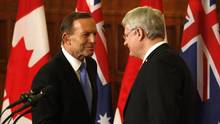June 10, 2014 – The world is undergoing a paradigm shift, not just because of environmental stress but because of a revolution that is altering discourse and decision making across the planet. I state this because of what came across the breakfast table this morning as I sat down with my newspaper.
I read that the Prime Ministers of Canada and Australia in a joint news conference stated that they recognized that climate change is an important issue but not one to be dealt with if it sacrifices jobs and damages the economy. The Australian Prime Minister went on to state that his reasons for eliminating the carbon tax of the previous administration was for that purpose. Both commented on President Obama’s executive initiatives to address reducing carbon from coal-fired power plants in the United States.
Australia, we were told, is taking similar action even though it has gutted its budget for tracking the evidence of climate change on the nation.
And Canada, proclaimed the Prime Minister, has already taken even more significant action in that sector of its economy than the United States even with these new initiatives, while at the same time stifling and cutting budgets to national research on the issue of climate change.
The Canadian Prime Minister went on to state that no country will sacrifice jobs and its economy in an effort to fight climate change and that Canada is willing to be more frank about this than others.
His exact words: “It’s not that we don’t seek to deal with climate change, but we seek to deal with it in a way that will protect and enhance our ability to create jobs and growth, not destroy jobs and growth.”
Should I describe this as delusional thinking?
Or is the Prime Minister a realist for the age?
I would argue the former rather than the latter because living in the present and only dealing with the present is what has got us into the current mess that is playing out before the entire world:
- Rising atmospheric temperatures (ask Australians in the Outback about this subject)
- Increasing extreme weather events (ask Calgarians about floods, Torontonians about ice storms, and Australians about wildfires)
- Record droughts
- Rising sea levels
- Ocean acidification
- Declining biodiversity on land and sea
- Increased melting of Arctic sea ice and permafrost.
These are just some of the obvious trends tracked by scientists who in both Australia and Canada are finding their voices being stifled by budgets withdrawn and “political facts.”
What the Australian Prime Minister was really saying is we want to continue mining coal and exporting it to Asia because that creates and keeps the jobs Australia has now. What he doesn’t want to admit is that coal extraction creates more carbon and when burned in Asian power plants further exacerbates global warming. But that warming he believes is not something of concern if only looking four years into the future.
What Canada’s Prime Minister is really saying is he wants to unlock the oil sands full potential by creating outlets to world markets through pipelines and increased production because that creates and keeps the jobs in Canada now. So what if oil sands extraction is carbon intensive? So what if right now it produces more CO2 than all other sources within the Canadian economy and is yet to be regulated in the same way President Obama is regulating emissions from the power sector, the U.S. largest source of emissions? So what if it expands even further and becomes an even greater source of greenhouse gases? National elections are a year away. Warming of significance may be decades away. And who can say that the next extreme weather event is really evidence of climate change? Prove it!
So let’s look at what can unseat this short-term thinking, the obsession of today’s national governments. What forces are at work to do this? The Internet, mobile communication, private enterprise initiatives, fund managers, social media, and think tanks have the means to bring the future into focus. As do local governments, those of states, provinces, counties and cities, who can do what is needed in the absence of national government resolve.
Conservatives argue that upsetting the applecart, the status quo, destroys an economy. Those addressing climate change need to counter status quo thinking through demonstrating policies and vision that stimulate economies through green initiatives.
Evidence abounds. In the Summer 2014 issue of “Corporate Knights,” the Green Provinces and States Report Card for 2014 looks at Canadian and U.S. jurisdictions measuring 10 key performance indicators that include the following among them:
- reducing greenhouse gas emissions
- reducing pollution
- decreasing water consumption
- reducing impacts on nature.
In addition these governments are assessed for initiatives such as:
- feed-in-tariffs for stimulating renewable sources of energy (a new industry creator and source of jobs)
- meaningful carbon emission reduction targets
- instituting carbon taxes or carbon cap-and-trade
- waste-diversion projects
- local improvement initiatives to finance or provide tax credits to businesses and homes to institute renewable and green projects
- sustainable forest and water resources initiatives
- recognizing accounting changes to reward green behaviors by corporate citizens
- green bond drives, and more.
Conservatives say that whatever success these “green policies” have had to date will soon end up with debt. They will counter the successes achieved by local governments with the kind of “logic” expressed by the Australian Prime Minister who killed a national carbon tax instituted by the previous government arguing it was a job killer. Yet British Columbia, in Western Canada, where a carbon tax has been in operation for several years provides evidence of the contrary. The Province has seen job growth while reducing its carbon footprint.
But there are environmental spanners in the works of the global economy today very much focused on sustainability and the future.
Fund managers are asking important questions about their investments in the energy sector asking CEOs and boards to address the impact of climate change. For them it’s about the money and unburnable assets reflected on balance sheets. They are asking fossil fuel companies to come clean about the future.
Universities and colleges are divesting themselves of shares in fossil fuel and other companies not focused on green initiatives and a sustainable future.
Social networks are becoming the voice for a growing segment of global citizenry concerned about environmental consequences from bad policy and practices by governments to companies that don’t take responsibility for dealing with climate change and the future.
Is this a revolution in the making, a successor to the antiwar protest movements of a past age?
In the 1970s, when I was a younger man, the anti-Vietnam War movement was all about the youth of the day demonstrating against a U.S. government enacting policy that did not reflect their ideals and values. The anti-war protests spilled over into countries beyond the borders of the United States to become a global movement.
In the budding social movements of 350.org, Avaaz.org, the occupy movement, and others, the same holds true today. These are successors to the anti-war protesters of the past. And governments that forge ahead with policy not reflecting the reality of climate change, a reality of critical importance to youth, do so without recognizing the future consequences of their acts in light of these organizing bodies. Today 350.org offers a virtual curriculum on organizing and acting against those in power and in corporate head offices that don’t address climate change and the future.
Finally, inaction about the future and climate change, shouldn’t be left to the struggle of young people. The elderly and the middle-aged are equally impacted by climate change happening now, something that President Obama spoke about at length recently. I know the President gets it but others in the U.S., at the national level, appear unable or unwilling to act to alter the future in a positive way. Let’s hope that the groundswell from below keeps its eyes firmly set on the future, organizing and acting on climate change to acclimate and mediate the changes the future will bring in the 21st century and beyond. We can ill afford to be led by the “more frank” Prime Ministers of this world.



















No need to mention the names of Australia & Canada’s Prime Ministers for if their delusional thinking is followed – there will be no history for their names to go down in. The economic problem with climate change is our thinking about tackling it which has to delve into the very core of our capitalist share trading system.
Here’s the strategic takedown: The Carbon Tracker Initiative (http://www.carbontracker.org/) has been putting the climate change situation in terms capitalists/investors understand – Evaluating financial risk to oil capital expenditures. Their very logical research states climate-related risks must be incorporated into investment analyses and therefore priced into the value of traded shares. Fossil fuel company shares are calculated under the assumption that all fossil fuel reserves will be consumed. However, that can’t happen and those shares should be devalued as a result because with a temperature rise of more than 2 degrees Celsius over pre-industrial levels — we humans can only send 570 more gigatons of carbon dioxide pollution into the atmosphere. Oil, coal, and gas companies already have on their books about 2,800 gigatons of CO2 which adds value to their share price. If those reserves are produced and the market burns those reserves, we’ll release five times more carbon than the atmosphere can handle. HOWEVER, this means that nearly 80% of known fossil fuel reserves are “inconsumable” if the planet is to have a chance of avoiding irreversible damage. So there won’t be a peak in fossil fuels production – rather there will be a peak in fossil fuel consumption. This means that a considerable amount of fossil fuels will have to remain in the ground in order not to put us over the carbon tipping point.
Optimistically, this means large amounts of money should migrate from “climate culprits” to the clean energy economy, resulting in a redistribution of wealth across many industrial sectors: The value of oil and gas will collapse to where it should be (about 20 per cent of its current size and declining to close to zero by 2050). Furthermore, new capital will stop flowing to fossil fuel exploration, freeing up trillions for climate-friendly investments.